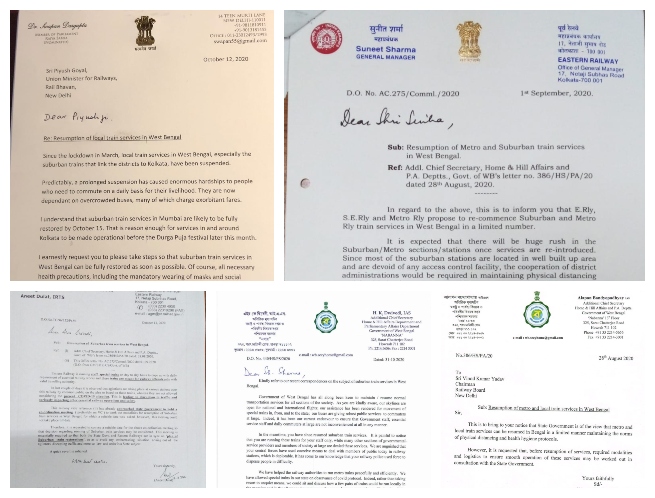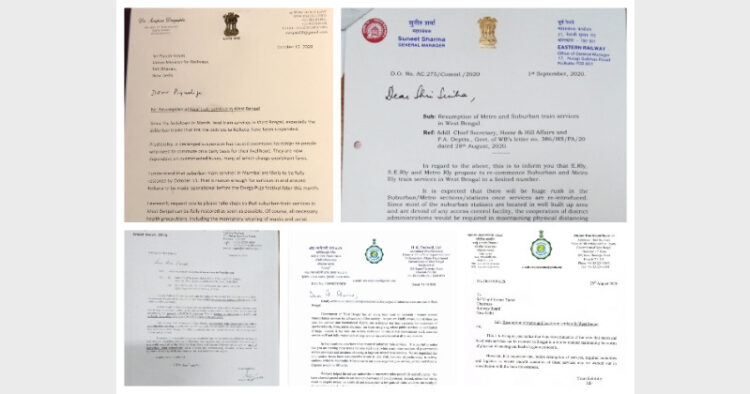
Debjani Bhattacharyya
Suburban local train services in West Bengal is suspended since lockdown was first announced by PM Modi on March 24. Local trains are the key transportation facility from Districts to Kolkata. The indefinite halting of services thereof caused financial disaster for innumerable people of the State. Lost jobs as they couldn’t commute. Hawkers lost place of business & couldn’t reach daily destinations to and fro.
Road transportation facilities of West Bengal are either of compromised quality or with inadequate service frequency with respect to demand. Moreover, the cost of Road transportation is much higher too, than that of Rail Services. Uncountable families got shattered as local trains were a lifeline to them.
On August 28, the then Additional Chief Secretary Home, GOWB, Alapan Bandopadhyay wrote a letter to the Chairman of Railway Board requesting resumption of metro and local train services in West Bengal in a limited manner maintaining the norms of physical distancing and health hygiene protocols. Bandyopadhyay requested a meeting between Railways & GOWB before the resumption of services to fix required modalities and logistics to ensure smooth operation.
Within 3 days of his letter, on September 1, GM Eastern Railways, Suneet Sharma responded back to the then Chief Secretary, GOWB, Shri Rajiva Sinha that Railways were ready to re-commence Suburban local and Metro Railway services in West Bengal. However, as most of the suburban stations of WB being located in well built-up area were devoid of any digital access control facility, Sharma requested for cooperation & assistance of District Administrations of the State in maintaining physical distancing and health hygiene protocols within the suburban stations & their surrounding premises. GM, ER proposed to hold a co-ordination video meet with GOWB at the earliest to work out the modalities.
After this letter, GOWB didn’t go for video meet with Railways. As per sources, the Health Department of West Bengal became apprehensive of further Covid Surge as a result of the commencement of Railway services tackling which was not practically possible for WB. The State’s gravely deficient Health Infrastructure was unable to face any further bigger challenge. This was the probable real reason why West Bengal sat silent regarding the resumption of local train services. However, the ruling dispensation of West Bengal tried to arrange to communicate to the mass that not to run trains in WB was a decision of the Railways i.e. GOI. Centre vs State conflict is the hallmark of West Bengal CM’s mode of politics. Her party preferred to portray the Centre autocratic & unsympathetic towards the people of Bengal in not resuming local suburban trains. However, BJP MP Swapan Dasgupta wrote a letter to the Railway Minister Shri Piyush Goyal on October 12 requesting him to resume local train services in WB as Railways were truly the lifeline of the State. The very next day after Dasgupta’s letter, Eastern Railways’ Additional General Manager Shri Aneet Dulat wrote another letter addressing H K Dwivedi, Additional Chief Secretary, Home, GOWB. He wrote that agitations were taking place at various rail stations of WB by the common public on the plea to board on those trains which ER were running specially for their staff. In this letter, ER expressed anxiety & frustration that such public agitation was causing traffic disruption and seriously affecting Railways’ other essential operations. Dulat, in his letter, referred to the earlier communication from the Railways to GOWB & said the video meet didn’t happen due to inaction from GOWB. Dulat further requested Dwivedi to expedite the bipartite video meet & reminded him that law and order being State Subject, it was GOWB’s responsibility to curb such undesirable law and order circumstances in Railway Stations.
Ever since this letter was issued from Eastern Railways, people of WB were eagerly waiting to note how & when would GOWB revert back to Railways. Finally, on October 31, Additional Chief Secretary GOWB, H K Dwivedi wrote a letter to Mr Suneet Sharma GM Eastern Railways. From the letter of Dwivedi, it appeared as if GOWB tried to ignore the letter issued by Shri Aneet Dulat on October 13 & started corresponding to Railways’ letter dated September 1 by Suneet Sharma. Mr Dulat’s letter reprimanded the inaction of GOWB & that is perhaps why Additional Chief Secretary, Home, shrewdly ignored that communication. It appears as if GOWB would prefer to deny, if possible, receipt of Shri Aneet Dulat’s letter dated October 13. H K Dwivedi’s communication appears more like a politician’s & unlike that of a public servant.
Dwivedi’s letter contained interesting claims such as “As you are kindly aware, our skylines are open for national and international flights; our assistance has been rendered for movement of special trains in, from, and to the state;”. The question may be raised how could WB, being a State of the Union of India, have blocked Indian skyline? Isn’t providing assistance in moving special trains in WB obvious, granted for public welfare & a Constitutional duty for GOWB?
Another politically misleading assertion in H K Dwivedi’s letter—”It is painful to notice that you are running these trains for your staff only, while many other sections of governmental service providers and members of society at large are denied these services.” GOWB could have avoided this pain at ease had the State sat together with Railways immediately after September 1 & resumed local trains thereafter. The BUREAUCRAT wrote “We are anguished that your central forces have used coercive means to deal with members of the public today in railway stations, which is deplorable. It has come to our knowledge that your railway police used force to disperse people in difficulty.”— Could Central Force do anything else to disperse unruly mob without the direct assistance of State Administration? The mob is being impatient & unruly to avail rail services & Rail Services couldn’t resume for general people due to inaction of GOWB.
H K Dwivedi added— “Indeed, rather than taking resort to unquiet means, we could sit and discuss how a few pairs of trains could be run locally in the morning and in the afternoon hours to serve the general commuters at large.” It can be noted that finally, GOWB wanted to sit with Rail. However, serious questions arise hereafter that does GOWB precisely know how many pairs of trains would suffice to carry all the people intending to avail rail services now? If a few pairs of trains run, all commuters are not likely to be able to avail them. How would it be decided who to avail & who not? What would be the basis of such a decision? Those who would attempt to avail the allotted few pairs of trains but won’t be able due to social distancing norms, how would they react? If such people go unruly & violent (as West Bengal has such antecedents & Railways already incurred a huge loss by a violent anti-CAA protest at Beldanga, Murshidabad in last December), would State Administration guarantee controlling them as Law and Order is a State Subject?
Additional Chief Secretary Home also wrote, “Obviously, all the norms of physical distancing and public hygiene protocol have to be maintained for plying these trains in the public interest.”—Question is, who would have the prime responsibility to maintain such norms? Would GOWB actively assist Railways to enforce those norms in Railway Stations & their surroundings? GOWB would have to come clear with all such statements.
H K Dwivedi’s letter to Eastern Rail is another corroborative evidence of the pungent LEGISLATION-BUREAUCRACY nexus that exists in West Bengal. Hon’ble Governor of West Bengal has been consistently vocal against it. As per sources, Additional Chief Secretary, Home appears to be the HOT BUTTON of the nexus. The arrogance of a Public Servant towards a colleague of Railways posed to fail the Constitutional Democracy of a welfare State & General Public stood the sole losers thereby. Such Bureaucrats, especially the Babu of Home Bengal needs to be sent on compulsory waiting, else system would continue to remain morbid even if legislation changes. Before changing Public Representatives, Public has right to get rid of corrupt Public Servants first.













Comments